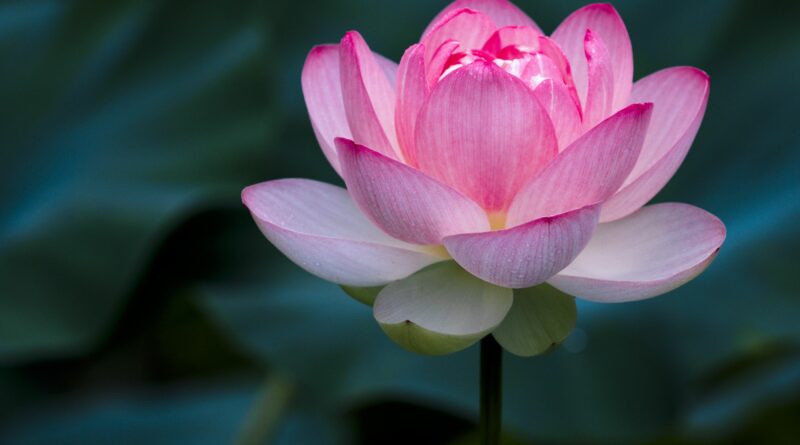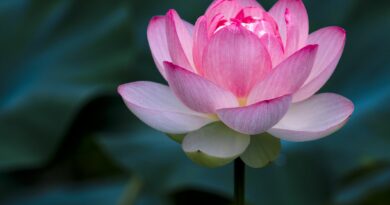Appreciating Your Practice
Appreciating Your Practice
January 5, 2019
When Ajaan Fuang taught meditation, he would hand out a copy of Ajaan Lee’s “Method Two,” and in “Method Two” there was a section that referred to jhana. After he’d have people read the whole of “Method Two,” he’d have them put it aside and say, “Focus on your breath,” but he wouldn’t talk about jhana at all. He would talk about the mind in relationship to the breath: ways of working with the breath, ways of working with the mind, ways of putting them together. When teaching individual people, he would ask them to describe their experience. Then, from their experience, he would give recommendations using their vocabulary. Part of the reason for this was to make sure that people didn’t start competing with one another over their jhanas. And part of it was to get them really sensitive to what was getting better inside as they meditated—because this is an important part of the practice.
If you’re constantly measuring yourself against the texts, you’re measuring yourself against ignorance, basically. You think maybe the texts mean x or y, but you don’t really know. What you can know is that while you’re practicing, the mind can settle down more than it could before, or there’s a greater sense of ease than there was before. You begin to see that certain unskillful ways of relating to your body, relating to the mind, relating to the world outside all fall away. And you want to appreciate the skill that you’re developing in and of itself, without any reference to how other people may be skillful or how they or some text might measure your progress. You want to be able to see for yourself that things are getting better and, as the Buddha would say, learn how to delight in that.
One of the customs of the noble ones is learning how to delight in abandoning and delight in developing. When you see, say, that some greed you used to have is just not there anymore, or your tendency to get angry over things is getting weaker, then delight in the fact that you’re able to abandon those unskillful things. As for a sense of well-being inside, a sense of being more settled, learn how to delight in that, too, because this delight is what keeps you on the path. You see for yourself that it really is worthwhile. You don’t need books to tell you.
I know of one meditation method in Asia where if they think you’ve gained stream entry, they have you listen to a tape to tell you what fetters you’ve abandoned. But if you’ve really abandoned them, you don’t need to be told. You know for yourself. If the method is constantly concerned about how someone reading the texts would judge what you’ve done, it makes the worth of your practice depend on somebody else. The real worth of the practice is what you can see for yourself in how you’re developing your mind.
This is how the Buddha developed his practice. He didn’t have any texts against which to measure his progress. But he noticed when he could get the mind to settle down with the breath and how he could get the mind to settle down with the breath. He noticed the ways that worked and the ways that didn’t work. He judged his meditation based on the level of stress and suffering still in the mind, and the types of stress and suffering that had been abandoned.
So focus on what you’re doing right now and try to be sensitive to what’s changing, realizing that it will sometimes take a while to see progress. One of the images in the Canon is of a ship with sails all rigged up. It’s been pulled up on shore and just left there. Gradually, the ropes and the sails rot away, the wood rots away. If you go today and look at it and go tomorrow and look at it, you won’t see any difference. But over time, you begin to realize, “Oh, yeah, it is rotting away.”
Another image is of using a hammer. The handle of the hammer will wear down over time. But if you look at it today and then look at it tomorrow, you won’t see any difference.
In the same way, sometimes it takes a while to see progress in your practice. Some changes are gradual.
Others, though, are more noticeable. You can see a thought coming up that used to hook you and make you miserable, but now it comes up and yet doesn’t make you miserable anymore. Appreciate that. You’ve made progress. Ajaan Maha Boowa talks about seeing little tiny flakes of bark get chipped off the trees of his defilements, and he took a lot of satisfaction in that.
So, when you see that there are areas where you used to get angry, or used to get lustful, or used to get greedy, used to be fearful, but it’s not happening anymore—at least not as easily—you’ve made progress. Appreciate that, because the whole purpose of the practice is to see that you’re making yourself happier in a totally innocent way.
Innocent happiness is really rare in the world. It comes down basically to three things: generosity, virtue, and meditation. When you find an innocent happiness that’s good for you, it’s good for other people, too. By finding a reliable happiness, it’s also good for other people, too, because if your happiness isn’t reliable, you’re frustrated and you start taking it out on others. If you’ve got something of solid worth inside and you know for yourself that it’s of solid worth, then you feel less threatened by other people, less exasperated by their behavior. So, the search for a solid happiness inside is not a selfish thing.
Think of the Buddha’s instructions to Rahula. If you see that you’ve made a mistake, be willing to talk it over with someone you trust, out of the desire to learn. If you’re going to be proud, be proud of your desire to learn. A certain amount of pride is necessary—the confidence that you have the ability to do this. If you realize that you’ve done something well, then, as the Buddha said, take joy in that fact and continue training. In other words, use that joy as part of the motivation to stick with it and get better.
Now, as you find joy in the practice like this, then the changes of the world—aging, illness, death, separation—don’t hit the mind so hard. Appreciate that.
This appreciation comes under the general heading of empathetic joy, mudita. We often think about empathetic joy as meaning not resenting the good fortune of other people. But it also means appreciating their goodness and knowing that their goodness will lead to good results—and appreciating your own goodness as well. Remember, you’re included in “all beings” when you say, “May all beings be happy. May all beings not be deprived of the good fortune they’ve attained.” You’re one of those “all beings.”
So, appreciate your practice. Appreciate the progress you make in the practice. This kind of appreciation helps pull you out of your likes and dislikes. You begin to realize the happiness that comes from developing a skill. The way you treat your own mind can be turned into a skill. It’s not the happiness of simply having nice sights, sounds, smells, tastes, or tactile sensations. You realize you’ve got something better that you can hold on to when the sights, sounds, smells, tastes, and tactile sensations turn bad. So develop an appreciation for your practice. Find joy in the effort. Find joy in the times when you make the effort and it actually succeeds. As for the times when it doesn’t, learn how to give yourself pep talks. Remind yourself that even the Buddha made mistakes.
But let the thought that there’s a goal you haven’t attained be like the tension on a bow when you’re shooting an arrow. If there’s no tension on the bow, the arrow doesn’t go anywhere. The realization that “I’ve got progress I need to make. There are areas where I’m still lacking”: Don’t let that get you down. Make it a type of motivation: “Okay, there’s work to be done, and I know a path for getting out of the situation my mind is in right now.” That thought can act as motivation for the effort that’ll actually get you to the point where you can master the practice.
All too often you hear, “Don’t have any goals. Just be in the present moment.” That’s like a bow that hasn’t even been strung. It just sits there. It can’t shoot any arrows; it doesn’t go anywhere. But the practice is meant to go someplace. It’s meant to arrive at an attainment, as the Buddha said, where you come to know what you haven’t known before, to attain what you haven’t attained before, to realize what you haven’t realized before.
We are going someplace. The “someplace” will be right here at the mind, but it’s the mind as it changes through the practice. And as it changes bit by bit by bit, you don’t have to worry about the noble attainments or jhana or anything. Just ask yourself, “Is the mind more still than it was before?” If it’s not, what can you do to make it more still, more solid, with a greater sense of belonging here?
In a lot of ways, the practice is basically learning how to feel comfortable in your own skin. That’s a lot of what concentration practice is about. As for the insights, an insight is useful if it actually has an impact on helping you develop some dispassion for things that used to get you worked up. That’s how you know if an insight is worthwhile. You can read in the books about the insights you’re supposed to have and then try to impose them on what you’re doing. Sometimes the lessons from the books are helpful, but sometimes they can be accompanied by pride or an over-estimation of what you’ve accomplished. That gets in the way.
So, simply notice when an insight comes: What does it do for the mind? How does it help the mind? If it helps the mind, fine. And if you find that tomorrow the same insight doesn’t do anything, that doesn’t mean the first insight was bad. It means simply you’ve got to develop more subtlety in your insight, to try things from a different angle. But appreciate the fact that yesterday it did help, so maybe today you can find something that will help as well.
Take heart from the example of those who have gone before you. This is why we have the contemplation of the noble Sangha: people who started out as ordinary people, just like us, and yet were able to develop their potentials into something really noble. It is possible. We have their examples. That’s meant to give us encouragement. How did they do this? They did it for themselves. They judged their practice for themselves and found that it was making them better people, making them happier, making them more reliable. They kept heading in that direction to see how far it would go.
That’s what we’ve got to do: just keep heading in this direction. That’ll give us a chance to taste some of the attainments they attained. And as you’ve appreciated your practice all along, it’ll help you really appreciate the big things, when they come, because you’ve learned how to read your actions and appreciate what they accomplish.



